With its convenient location, significant government subsidies and reputation as the tech hub of Southeast Asia – not to mention its access to quality talent which puts Silicon Valley to shame – Singapore has unsurprisingly become an attractive location for Asia’s most exciting startups. As such, we are seeing some of the most innovative companies springing up by the day.
Ahead of the debut of DATAx Singapore on March 5–6, 2019 – a fast-paced festival bringing data science into the real world across four stages, with 50 speakers and 450 innovators – we look at 20 of the most inspiring startups working in the tech world.
Logistics and transportation
Grab
GrabTaxi Holdings offers ride-hailing/sharing transport services, food delivery, logistics services and payment solutions all through its app.
From its beginning in Singapore in 2012, the company has expanded significantly and now offers its services all across its neighboring Southeast Asian countries such as Malaysia, Indonesia and Vietnam.

After an extraordinarily successful year in 2018, Grab has announced it is set to raise a total of $3bn in new funds, a figure that includes a whopping $1bn investment from Toyota. According to CNN, the company is currently valued at more than $11bn – not bad for a six-year-old.
It made headlines in March 2018 when it bought out Uber’s operations in eight Southeast Asian countries in a concerted effort to totally dominate those markets. However, it has expressed a desire to be known as more than a ride-hailing company. Grab president Ming Maa has claimed that he plans for the company to become “a daily lifestyle platform”.
However, despite turning a revenue of $1bn in 2018, the company has yet to make a profit.
“We’re working on it,” promises Maa.
Ninja Van
Since Ninja Van’s inception in Singapore in 2014, its success has snowballed until it grew to be Southeast Asia’s fastest developing last-mile logistics company, helping companies optimize their logistics with the latest technologies available. In particular, the company has a focus on e-commerce.
Ninja Van is now active in Singapore, Malaysia, Indonesia, Thailand, Vietnam and the Philippines. It promises enterprise logistics solutions powered by cutting edge technology, reliable and flexible deliveries and real-time tracking through email and SMS.
At the beginning of this year it also became one of the most well-funded logistics startups in Southeast Asia when it raised at least $87m in a round of funding in January. It managed to attract DPDgroup, a European parcel delivery company which delivers around 4.8 million parcels around the world every day – a collaboration which will likely lead to further successes for the firm.
SkyFy
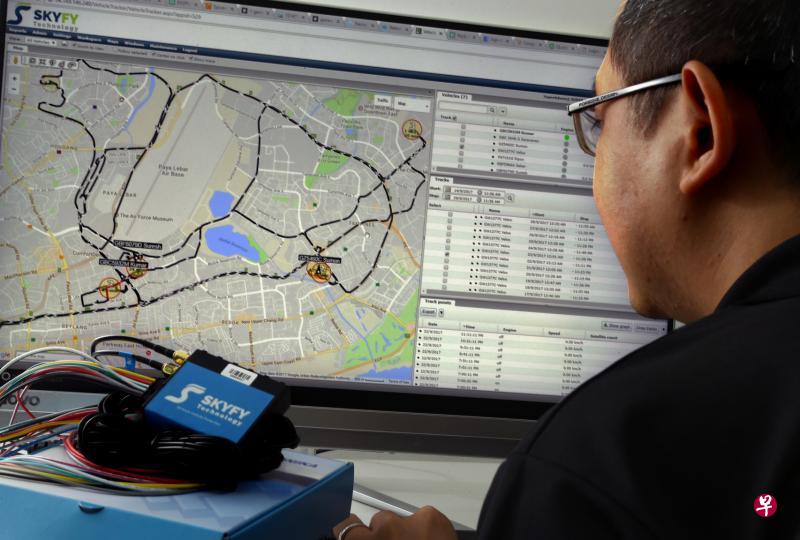
Inspired by the phrase “Sky for you”, SkyFy has created a supply-chain management application using IoT and vehicle telematics to allow companies to monitor, track and control their vehicles from anywhere.
“Before the jobs get sent out to the drivers, it needs to be route optimized,” explains SkyFy’s director Joseph Ng. “Every day the company will get the jobs, input them into our system to optimize and dispatch to all drivers… route optimization is based on many constraints such as vehicle size, cargo size and priority of the customer. So all these have to be taken care of, calculated and optimized by A*STAR, and now we license it.”
So far, SkyFy has worked with more than 16,000 clients, including NTUC’s Unity Pharmacy, ZTP and Yummi House.
Finance:
CashShield
Founded in 2008, CashShield is an online fraud detection startup that helps companies utilize AI in the fight against fraud “powered by high frequency trading algorithms, real-time pattern recognition and passive biometric analytics”.
With several high-profile clients, including Alibaba and Razer, CashShield claims its technology currently secures around 10 million user accounts and $500m in gross merchandise volume every month.
What’s more, with only a decade of experience under its belt it is an incredibly ambitious company.
“Currently CashShield caters to securing against payment and account fraud but is also working on adding on different fraud screening abilities to secure all vulnerable entries to fraud including click fraud, IoT authentication, claims fraud and KYT [know your transaction],” CashShield founder and chief executive officer Justin Lie said.
“As such, we are looking to invest further efforts to build our R&D capabilities to enhance the core technology while scaling more aggressively in the markets we are targeting globally.”
In June 2018, it raised $20m in a Series B funding round led by Temasek Holdings, bringing its total to $25.5m. This certainly is a company to watch over the coming years.
ADVANCE.AI
ADVANCE.AI is a data-driven financial technology company founded in 2016 with offices spread across Singapore, Beijing, Jakarta and Manila. The company utilizes big data and AI technology to create a safe, convenient and effective one-stop big data intelligent analysis application platform.

“Combining the best domain knowledge in big data, AI and credit scoring, ADVANCE.AI brings the next generation data centric platforms to transform traditional and emerging industries across Asia Pacific,” reads its website.
ADVANCE.AI has so far raised a total of $50m in a series B round in July 2018 from six investors, including China Vision Capital.
Visit DATAx Singapore on March 5–6, 2019
AIDA
Founded in Singapore in 2016 by several PhD-level scientists, AIDA Technologies provide AI-enabled predictive analytics solutions and intelligent systems for banking and financial services.
AIDA assists companies that are understandably struggling to utilize the huge quantities of data generated today from a number of sources, with a focus on banks and insurance industries in the Asia-Pacific region. It uses AI-driven analytics to augment a human expert’s ability to make decisions from large heterogeneous data sets.
It has also developed a number of machine learning (ML) technologies to reduce false positives when detecting outliers, a deep learning engine for text analysis, a specialized model able to detect conceptual drift and an application for extracting information from documents.
“AIDA’s unique IP and methodology enables rapid solution development, a faster convergence to predictive models our customers can use and a more accurate prediction of the final outcome,” the company claims.
“At AIDA, we have developed mechanisms to provide interpretability and explainability for the sophisticated ML approaches,” explains Shonali Krishnaswarmy, chief technology officer at AIDA. “Focusing on business metrics we are able to extract reasons for a machine’s scoring or decision.”
Datarama
Combining human analysis with advanced technology, Datarama provides organizations with “complete business intelligence” through a “one-stop source for hard-to-find information and risk analysis”. This way, it helps make due diligence and deal identification cheaper and faster.
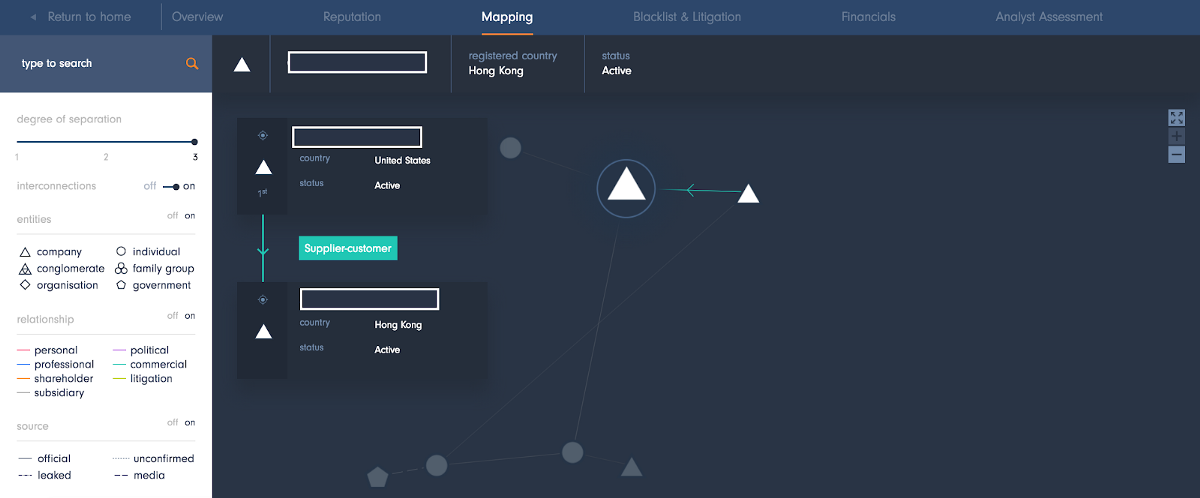
The key services it offers include cataloguing hard-to-find company information, an interactive mapping tool, automated blacklist checks, reputation index and an on-demand multilingual analyst team.
Upon joining the company’s advisory board in November 2018, Dr. Parag Khanna commented: “It is an exciting company that is revolutionizing the due diligence and compliance space. Datarama has become the go-to in the region for some of the world’s leading banks, private equity funds, asset managers and GLCs.”
Founded in 2015, it received one round of seed funding from investment company TC Capital in the same year. According to the company’s site, its coverage includes almost 1.4 million companies and some 1.4 million individuals while mapping out the 4 million+ relationships between them – that is a lot of data.
Bambu
Bambu is a white-label robo-advisory tech platform for all financial institutions and consumer brands, offering companies the ability to integrate and benefit from the ongoing and radical digital transformation in wealth management. Founded and headquartered in Singapore, the company was established by industry experts Ned Philips and Aki Ranin.
Aside from its headquarters in Singapore, it has subsidiaries in Hong Kong and the UK. The company raised $3m in a Series A funding round led by Franklin Templeton Investments in July 2018.
“Early this year we already surpassed the growth targets we had set for 2018, with seven new clients preparing to go live between the Asian and US markets,” commented Phillips upon landing the funding. “This proves our B2B business model is working, as there is real global scalability without large capital requirements. Our next ambitious goal is to get 1 million end users on the platform by 2019.”
Hearti Lab
Hearti Lab is a human resources management platform, attempting to effectively breach the void between the corporate and personal insurance sector with two complementary low-cost, full-featured AI platforms: BENEFIT X and SURETY AI.

The BENEFIT X platform offers employee insurance to corporate customers with a value-added employee wallet specifically for benefits management. SURETY.AI allows general and life insurers to communicate more effectively with their customers using a chatbot which leverages the latest developments in AI. The chatbot helps companies learn and understand consumer behavior patterns which then facilitate the underwriting and distribution of insurance policies.
The company was founded in Singapore in June 2015.
E-commerce/marketing
Lazada
Headquartered in Singapore, Lazada is an online shopping and selling destination catering to Southeast Asian countries including Indonesia, Malaysia and Thailand. Since its beginning in 2012, it has grown to help more than 100,000 local and international sellers in addition to 2,500 brands and has gone on to achieve the legendary unicorn status that so many Asia Pacific companies reach for.
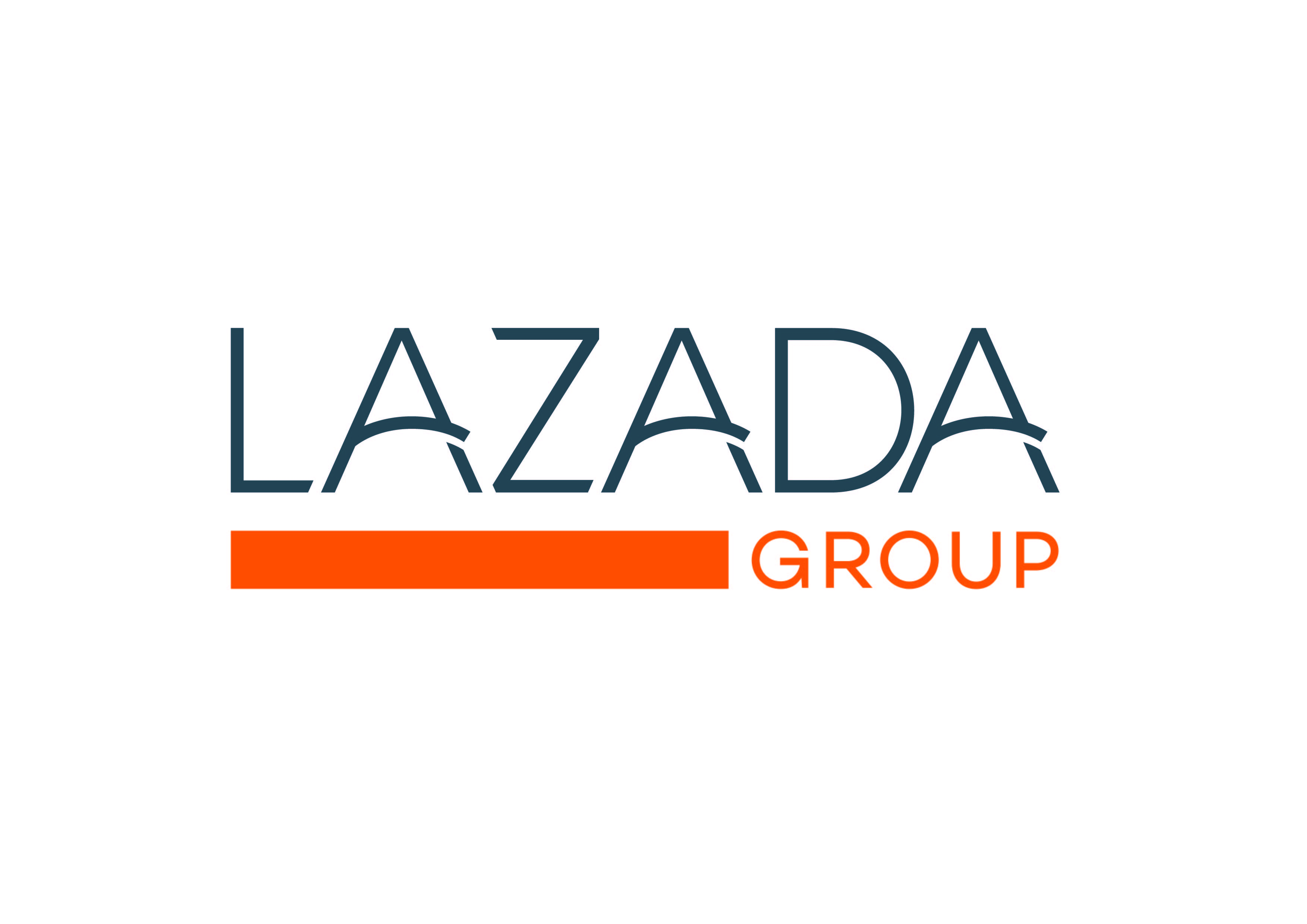
The colossus of global proportions, Alibaba, has been one of its key investors since the start and it acquired control of the startup in 2016 when it bought a 51% stake for $1bn. It has since invested a further $3bn into the e-commerce platform, proving its worth as one of the region’s most exciting startups.
“With 300 million SKUs available, Lazada offers the widest range of products in categories from beauty, fashion and consumer electronics to household goods, toys, sports equipment and groceries,” the company states.
Awesell
Founded in 2017, Awesell is a SaaS business management app for dropshipping businesses that that helps companies streamline workflows and management of sales and shipments. Its platform helps dropshippers centralize managing and recording products, customers and shipment orders all in one app, conveniently streamlining a process that contains a huge number of variables.
Awesell caters to businesses of all sizes, from the very small to the very big, and offers shipment tracking, inventory management and an intuitive chat management system. Since around 27% of online retailers have now adopted dropshipping, it has established itself with a client list that is set to keep growing and growing.
The app is available on Google Play and App Store.
Deal’n
Deal’n is an e-commerce startup working to bridge the gap between the traditional consumer market and those vulnerable in society, with a mission statement to champion community over individualistic goals of profit.
Started in early 2016, Deal’n’s platform highlights the digitized trading and sharing of useful skills, upcycled and recycled products, allowing individuals to trade things that would normally be difficult to sell or share.
“Our platform empowers users by transforming their basic skills and talents into a traded currency, while supporting sustainability by fostering the trade of used goods, reusing, up-cycling and championing creativity through innovative methods rather than traditional ones and partnering with local NGO’s such as; DOT (daughters of Tomorrow) empowering underprivileged women, ISCOS (supporting ex-offenders and their partners), community centers (identifying families subsidized by the government),” comments the company.
Deal’n is currently in the process of raising $800,000 in Series C funding, to find out more click here.
Jet 8
Founded in 2015, Jet 8 is dead-set on its mission to use blockchain to tokenize the influencer industry, allowing anyone who posts creative, engaging content to become a paid influencer. By using the blockchain, personal data is fully controlled by the user themselves, meaning brands looking for access would have to bid for it – and this is how Jet8 are “democratizing influence”.

“JET8 is powered by authentic user-generated content, allowing anyone to become a paid micro-influencer, earning from their social influence,” explain Jet8 co-founders Mike Allen and Joshua Thomson
“Any of our Decentralized Engagement Networks (DENapps) will allow anyone anywhere in the world to share branded content with stickers and frames, which earns them JETS — JET8’s in-app social currency. JETS allow users around the world to redeem products online or over-the-counter through 15,000 retail stores including 7-Eleven in the Philippines, Circle K in Indonesia, Shop&Go in Vietnam or Shoprite and Checkers in South Africa, among many others,” they add.
The network currently reaches a whopping 400 million social accounts.
Energy
Sunseap
Sunseap Group was founded in Singapore in 2011 with the aim of delivering affordable and sustainable energy and has grown to become the largest clean energy solutions provider in the country.
The firm currently operates through three key units: Sunseap Leasing, Sunseap International and Sunseap Energy. Sunseap Leasing was the first and is now the largest solar leasing company in the country. Sunseap International operates in markets in the Southeast Asian and Pacific regions. Sunseap Energy provides clean energy solutions utilizing off-site arrangements by drawing on solar systems within the group’s portfolio of distributed generation assets.
Its largest, most exciting client is almost definitely the tech giant Apple, who recently signed an agreement with Sunseap to obtain 100% of its local energy requirements from renewable sources with the company.
Most recently, it has announced plans to build one of the world’s first and largest sea water floating solar systems – watch this space.
ELECTRIFY Asia
Founded by Sunseap’s former senior manager Julius Tan Chie-how, ELECTRIFY is a blockchain-based retail electricity marketplace addressing the need for transparency with a mission statement to “build an intelligent energy ecosystem for Asia”. The energy trading startup was founded in 2017 to form Singapore’s first digital peer-to-peer marketplace for retail electricity trading.
Using blockchain technology, ELECTRIFY allows greater transparency and predictability of supply and demand, enabling greater trust between the various parties when trading.
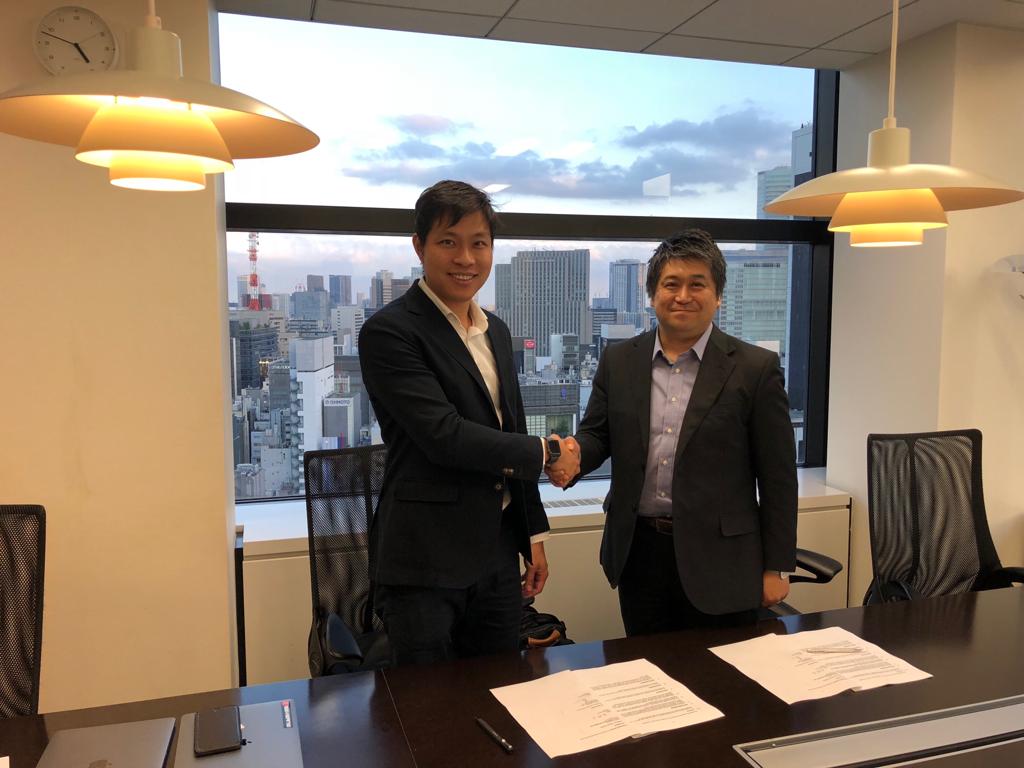
ELECTRIFY has recorded a GMV of more than $10SGD ($7.3m) and has transacted more than 60GWh of electricity for both commercial and industrial customers since beginning.
And the company has plans to expand into the mainland market.
“We are definitely open to exploring the Hong Kong and China market…the southern China market is partially deregulated, so there is an opportunity for us,” Tan said in an interview with South China Morning Post.
AirTrunk
With its motto “where the cloud meets the ground”, AirTrunk entered the Singapore market in 2014. It develops and operates large-scale wholesale data centers leading the APAC with reliability, technology innovation and energy efficiency.
“We’ve reimagined the data centers of yesterday and use our regional expertise to build hyperscale data centers that are more cost-effective, scalable and available”, says AirTrunk on its site. “Data centers where our customers can house the future.”
The company has so far raised $1.3bn in two rounds of funding.
Green Koncepts
Boasting more than 12,000 connected nodes on its platform and more than 800 million transactions of data streaming through its systems daily, Green Koncepts tracks energy consumption for companies using a cloud-based IoT system. It has a suite of energy management solutions that it has created specifically to be as easy to use, install and manage as possible in its efforts to help individuals and businesses visualize, manage and optimize their energy usage. The company does this by helping to automate homes, offices or buildings, providing users with control of electrical appliances through a simple web or mobile interface.
“Our award-winning KEM Platform empowers our customers with real-time energy visualization, advanced analytics and intelligent controls that help them drive energy savings and shape behavior,” explained Green Koncepts CEO and founder Kenneth Lee.
“As the KEM Platform interoperates with thousands of devices worldwide and supports multiple protocols, our customers get an open and interoperable solution,” he adds. “This allows them to leverage existing investment in their meters and sensors while enabling centralized management of data generated by these devices over the cloud in real time.”
Chatbots
Evie.ai
Evie is an AI-powered virtual assistant – a smartbot who schedules meetings and interviews to “power intelligent enterprise”. The software integrates seamlessly into individual’s workflows powered by MetaFlow, an AI engine. It is currently used by more than 400 companies in 48 countries around the world, with big names such as Siemens and Unilever already signed up.
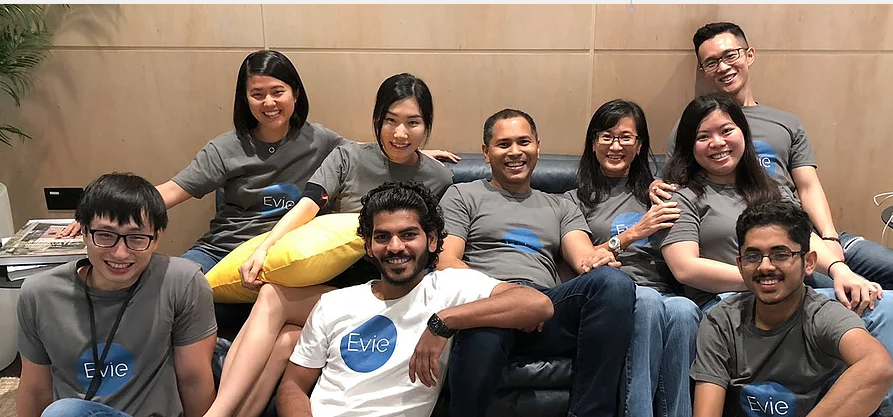
Beyond just scheduling meetings and interviews, Evie handles multiple time zones, books meeting rooms, tracks to-dos and updates Salesforce in addition to giving companies and individuals insights and analytics for optimization.
“At Evie.ai, we invent the future of work – smarter workplaces where people partner with AI employees, amplifying human intelligence and creativity in order to deliver superhuman productivity, unprecedented operational efficiency and new business opportunities,” reads its website.
The Singapore-based company has been running since 2014.
Pand.AI
This Singapore-based startup specializes in deep natural language processing (NLP) to create a comprehensive chatbot for digital sales and marketing for “the new world of conversational commerce”.
“The word “pandai” means “smart” or “clever” in Malay, but is also commonly used to describe someone who is good at a certain craft,” says Pand.AI. “We are adopting it as our name to demonstrate our commitment to develop deep-tech chat AI for our clients that not only make them sound smart, but even smarter in closing sales.”
Founded in 2016, Pand.AI’s clientele list now contains a number of firms from the Fortune500.

Zumata
Zumata is a technology startup founded in 2010 which aims to help simplify travel booking using AI technology. To do this, it has most recently developed a chatbot which allows travel agents to better respond to customers by automating business and providing 24/7 availability. Powered by AI, NLP and ML technologies, Zumata’s chatbots are able to provide contextually relevant questions and answers in almost 40 different languages.
Zumata’s chatbot can communicate with customers across almost all platforms, including Facebook Messenger, WeChat, Kik, Skype and Twitter. The software is also able to intelligently analyze the user’s tone and intent and respond appropriately, while escalating the conversation to customer service staff if needed.
“Advising customers on their enquiries in real-time, through many channels, in any language, and at any time of day, is a dream for most companies,” says Josh Zielger, CEO of Zumata.
“Our data shows that we can address well over 70% of the enquiries for our existing clients. The financial savings from automation are incredible, and what’s often not talked about is how the customer receives a better experience at the same time. Gone are holding times and long chat delays – AI is simply a better customer service option for most enquiries,” he adds.
Visit the debut of DATAx Singapore on March 5–6, 2019 to enjoy an invigorating festival comprised of four stages 50 speakers and more than 450 innovators. See the agenda and buy tickets HERE.

